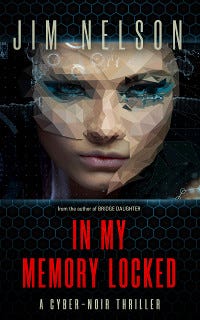"Take care of your backlist, and your backlist takes care of you"
It's all material.
At an AWP panel discussion, Lawrence Block related a bit of wisdom he’d heard from another author years earlier: “Take care of your backlist, and your backlist takes care of you.” I don’t recall his exact comments, but he added the advice had served him well over his writing career.
When I heard this, I’d yet to publish my first novel. I committed that line to memory because I thought it was worthy. No one works with pen in hand for as many decades as Lawrence Block and not come away with a thorough understanding of the nuts-and-bolts of the writing world. (Check out his “Selected Bibliography”—most likely incomplete—for an idea of the scale of his output.)
I didn’t have a backlist, though. How could I take care of that which does not exist?
(Quick terminology clarification: The standard use of the term “backlist” refers to a publisher’s catalog of titles released in prior years but still in print or stock. I took Block’s usage to indicate the sum of an author’s work, in print or otherwise.)
In many ways, it was Lawrence Block who persuaded me to jump onto the e-book publishing bandwagon. He related to the panel audience that, when he investigated Amazon’s Kindle Publishing, he realized he could release all his out-of-print books in electronic form and sell them direct without having to shop them around for a publisher. He went through his old contracts and re-acquired rights to books the publishers had let lapse. He even paid his agent fifteen percent of the royalties he earned on his direct-sale e-books “because it was the right thing to do.”
Returning home from the conference, it occurred to me that I was selling myself short. I’d published a few short stories in literary journals in the U.S. and Britain, enough to put together a story collection. A few years earlier, a small non-profit in Oakland had published a short run of a novella they’d commissioned from me. A big-name author might not call this a “backlist,” but I reasoned for a small-fry like me, it was a start.
Take care of your backlist. Anything you’ve written and published—an old blog, a book review a university journal printed, that thing you wrote for a neighborhood newsletter—is backlist. Go through your computer directories, dig up old clippings, make a list of everything you’ve done.
Here’s some ideas for taking care of your backlist:
If you’re building a book series, bundle them into a e-book boxed set edition.
Collect your short stories into a book. That short story you couldn’t place? That can fit in as well.
Convert your blog into a book. Over the years, I’ve written a number of entries on book, film, and television. I’m thinking about gathering them up and producing an essay collection.
Work with writers you know, who live in your area, or who write in the same genre. Assemble a collection of short stories or first chapters. Each author can include a short bio and links for readers to buy more of their work.
Look to new media to take advantage of your backlist. YouTube, audiobooks, and podcasts offer new ways to make your work available.
What’s the point of all this? Will this make you money?
Maybe…and maybe not. Don’t overlook using your backlist to increase your exposure. Short story collections don’t sell particularly well—they never have—but you can offer a collection as an incentive for people to sign up for your mailing list. Services like Patreon are always asking you to think creatively about sharing additional work with your patrons. A few additional titles on your web site and author’s pages don’t hurt. And you never know when one of these side avenues piques a reader’s interest and leads them to try your more recent work.
Pandemic blues
The Washingon Independent Review of Books published an essay asking, "“We’re living through a pandemic. Must we read about one, too?” Since I recently published a new novel set during the COVID-19 pandemic, I thought I’d chime in:
I started keeping a diary when the pandemic surged in America. For the first few months, I wrote daily, almost religiously, dumping my despair and puzzlement onto the page. When the world opened up and grew less tense, I thumbed back through my notebook and discovered a voice I did not quite know. It was me, but it was not a me I easily recognized. …
Out of all this arable soil grew a claustrophobic, paranoid book about an isolated security guard who can’t tell if he’s detaching ever-so-gradually from reality. Podcasts, experts, and so-called experts fill his ears with contradictory takes on the world’s sudden course correction. That voice from my diary was now his.
Why wouldn’t I write that book?
The full post is at j-nelson.net. The book, Man in the Middle, is available at Amazon.
In My Memory Locked is a detective story set in near-future San Francisco. It’s a world of computer viruses attacking the id, specialized neuroliquers washing away bad memories, and a worldwide social network wired into everyone’s head.
Fans of Dashiell Hammett, William Gibson, and Philip K. Dick will find a familiarity with this story. Fans of mystery novels will find plenty in it for them as well.
Available now for Kindle and in paperback. More information can be found at j-nelson.net

